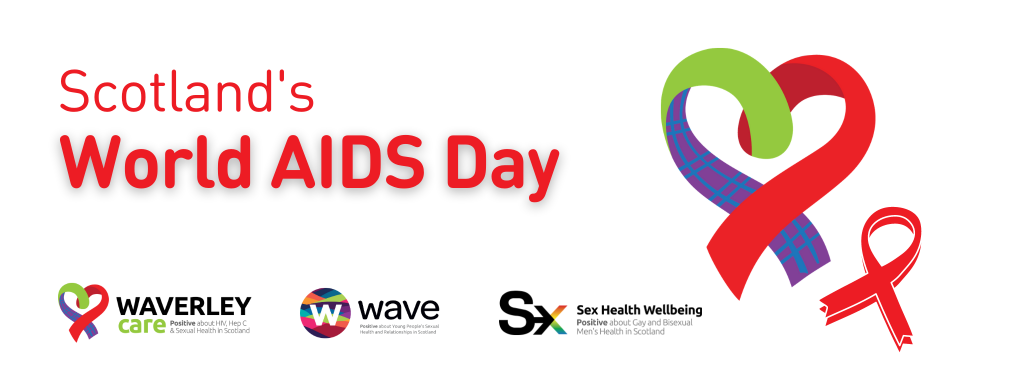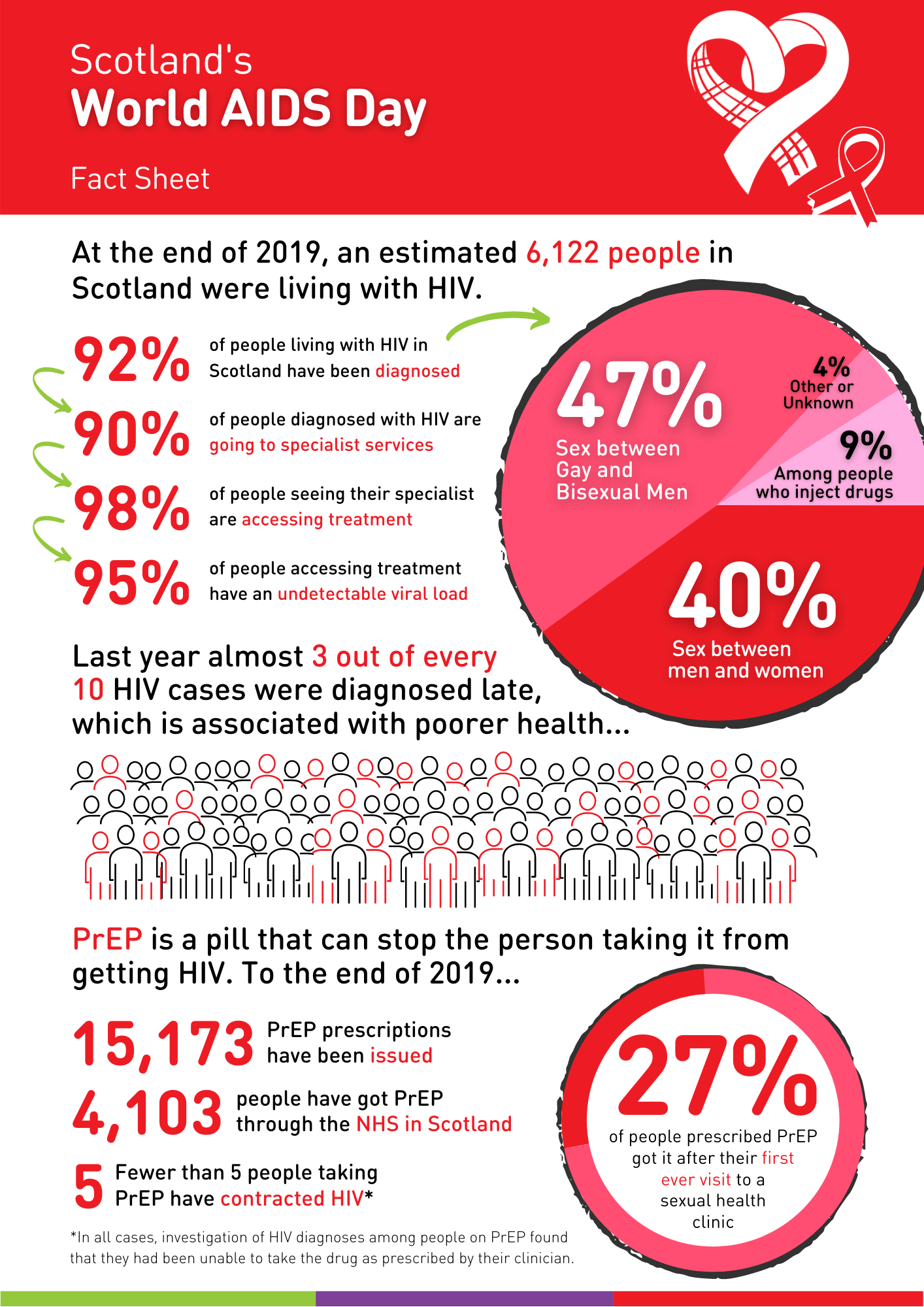Scotland’s World AIDS Day

Ahead of World AIDS Day on 1 December, we’re teaming up with our parent charity, Waverley Care, to raise awareness of HIV in Scotland, to celebrate the progress Scotland has made, and to highlight the action still needed to challenge HIV stigma.
For over 30 years, Waverley Care has been the leading charity in Scotland’s fight against HIV. This World AIDS Day, we need your support to keep going…
Know the Facts…
We’ve put together the short Q&A below to give you the facts about HIV, and why we’re still talking about World AIDS Day in 2020.
Help us by reading and sharing this information with your friends, families and colleagues…
HIV (or Human Immunodeficiency Virus) is a virus that infects our white blood cells, making it harder for the body to fight off everyday infections.
Over a long time (often many years) HIV will gradually weaken a person’s immune system to the point where it can’t fight off infections that a healthy immune system would normally handle.
At this point HIV becomes known as AIDS (Acquired Immunodeficiency Syndrome). Today in Scotland, very few people develop AIDS because of effective testing and treatment.
In a word, lots.
Effective treatments allow people to control their HIV and live long, healthy lives, while advances in prevention are helping to reduce the number of people who are getting HIV.
We believe that with the right support, Scotland can achieve zero new HIV infections by 2030.
Because we're not there yet - the single biggest barrier to achieving zero new infections in Scotland is stigma.
Attitudes to HIV continue to be heavily influenced by memories from the 80s and early 90s, before effective treatments, when many people lost their lives to the condition.
We still meet people who think HIV is a death sentence, or that it can be passed on by kissing, neither of which are true.
It doesn’t have to be this way - the science is there and it is time for society to catch up.
In Scotland, HIV is mainly passed on during unprotected sex (e.g. without condoms), or by sharing injecting equipment.
HIV is DEFINITELY NOT passed on through kissing, sneezing, spitting, sharing cutlery or using the same bathroom.
Early symptoms of HIV can be mild and easy to miss.
In the weeks following infection, most people will get a flu-like illness that can include fever, sore throat, aches and pains.
After that, it can take many years for other symptoms to develop, by which point a person can become very ill and potentially be diagnosed with AIDS.
Because the symptoms are so mild, the only way to know if you have HIV for certain is to get tested.
Getting an HIV test is quick, easy and confidential, with some tests giving you results in minutes. HIV tests are provided to anyone free of charge on the NHS.
There is not a cure for HIV, so a person living with HIV will have it for the rest of their lives.
However, effective treatments are available that control the virus, stop it spreading and allow people to live long and healthy lives.
The earlier that someone is diagnosed with HIV and starts treatment, the better in terms of their health.
In Scotland, HIV is most commonly passed on through unprotected sex or through sharing injecting equipment.
Depending on your circumstances there are lots of ways you can reduce the risk of either getting or passing on HIV.
Condoms and Lube
Used correctly, the trusty combo of condoms and lubricant remains one of the best ways to prevent the spread of HIV. They can also protect you from a whole range of other STIs.
We’ve got lots of information about condoms here.
PrEP
- PrEP is a pill that stops the person taking it from getting HIV
- PrEP is available to people at the highest risk of HIV through the NHS in Scotland
- Some people choose to buy PrEP online, and there are specific websites dedicated to helping people to do this as safely as possible.
Along with partner organisations, we are supporting www.prep.scot, an online source of information about PrEP, including details of the eligibility criteria used by the NHS.
PEP
If you’ve had sex and think you may have been exposed to HIV, you can access treatment known as PEP or PEPSE (Post-Exposure Prophylaxis).
- PEP involves a four-week course of tablets, and can vastly reduce your risk of HIV infection after you have been exposed.
- You should be able to get PEP at most sexual health clinics and in hospitals (usually in the A&E department).
- The sooner you start the course after you think you may have been at risk of HIV, the better. Ideally, this should be within the first 24 hours, though PEP may be offered up to 72 hours after exposure.
U=U (Undetectable=Untransmittable)
- U=U is a message that shows how effective HIV treatments are today.
- HIV treatments work by reducing the amount of HIV in your body.
- When the amount of HIV gets below a certain point, HIV becomes undetectable. In other words, it means HIV can no longer be found in your blood.
- Your viral load will only become undetectable if you have been taking HIV treatment for more than 6 months and if you continue to take it as prescribed.
- Your HIV doctor is the only person who can confirm that you are undetectable.
- If your viral load is undetectable and you are taking your HIV treatment as prescribed, you cannot pass HIV on through sex. This is called untransmittable.
- U=U only prevents HIV being passed on through sex – it doesn’t prevent HIV being passed on through other routes such as sharing injecting equipment.
- U=U is only about HIV and does not prevent passing on other STIs. Using condoms and lube is the best protection against STIs.
Clean injecting equipment
If you are living with HIV or worried about HIV transmission through injecting, you can prevent the spread of HIV by always using clean injecting equipment and, never sharing injecting equipment.

Support Waverley Care (and Wave…)
The work that Waverley Care does across Scotland, including here at Wave Highland, is only possible with your support.
Help us to continue being there for people living with HIV, and to work towards a Scotland where new HIV infections are a thing of the past.
Donating to Waverley Care regularly spreads your donation over the year and allows you to choose the date that you make payment. You can donate monthly, quarterly, half yearly, or annually by Direct Debit.
If you’d like to make a regular donation, you can:
- Donate online by using a debit or credit card and selecting the regular giving option through the Charities Aid Foundation. It’s quick, easy and secure.
- Donate by post by completing our Direct Debit form and returning it to: Waverley Care, 3 Mansfield Place, Edinburgh EH3 6NB.
- Donate by phone by calling Matt or Holly at Waverley Care on 0131 556 9710.
You can also make one-off donations using the above methods.
Remember to Gift Aid! For every £1 you give, Waverley Care can get an extra 25p from HM Revenue & Customs at no cost to you. If you are a taxpayer and qualify, remember to click the box to gift aid through the Charities Aid Foundation or complete the Gift Aid section of our Direct Debit form when you return it by post.
Your fundraising is more important than ever. Here are our favourite ideas of how you can support Waverley Care right now:
- Take on a red run... walk, swim or climb on World AIDS Day! Choose your challenge, dig out your red lycra and get training. Whether it's a 5k around your local park or indoor stair climb, create a fundraising page on Facebook or Virgin Money Giving and ask friends and family to sponsor you.
- Host a virtual birthday - Missing your birthday celebrations? Why not host a virtual birthday and ask for donations to Waverley Care instead of gifts and cards. Get started on Facebook or Virgin Money Giving
- Hold a virtual bucket shake - Bucket shaking has always been a huge part of our fundraising, from the bright lights of theatre to the cold and breezy street collections. We've missed out on hundreds of shows this year and seen a huge loss of donations. However, this isn't going to stop us fundraising and you can shake a virtual bucket instead! Find out more about Virtual Bucket Shakes
Any questions?
If you'd like to speak to us about your fundraising ideas, please email Holly and Matt at fundraising@waverleycare.org or call 0131 556 9710.
Join us at an event
On an around World AIDS Day, we’re planning a number of online events alongside Waverley Care to raise awareness of different aspects of HIV in Scotland.

